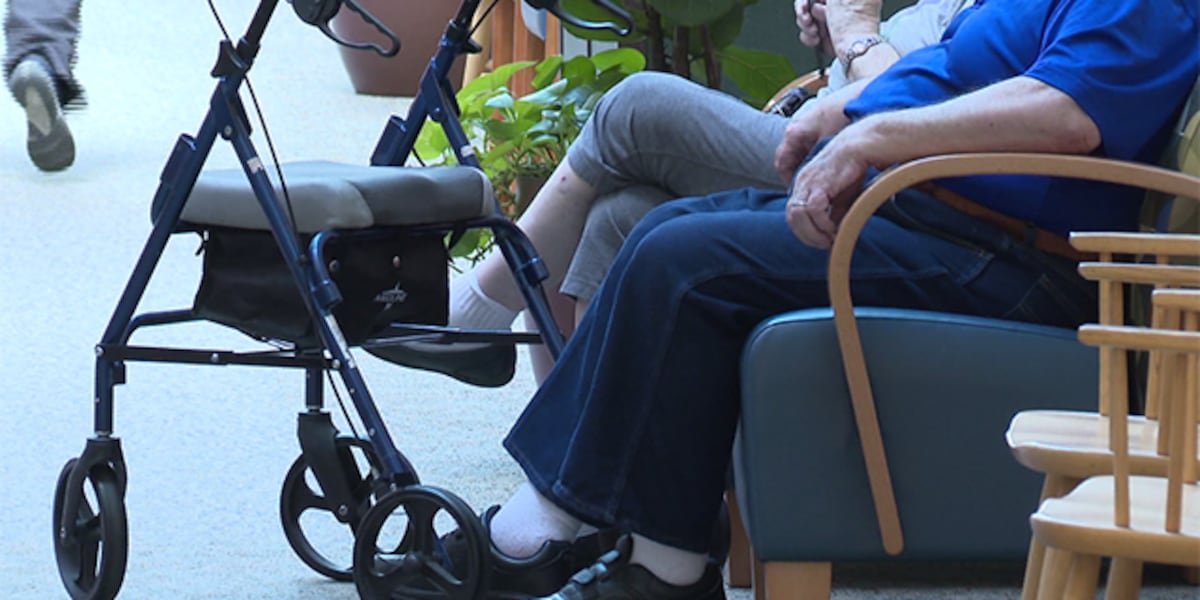Iowa
‘Where’s the outrage?’: Iowa nursing homes in a state of crisis, Democrats say

DES MOINES, Iowa (Gray Television Iowa Capitol Bureau) – Iowa Senate Democrats are demanding an oversight investigation into the state of Iowa’s nursing homes. After hearing stories for months in the press about abuse and neglect in the state’s senior care facilities, Senate Democrats say enough is enough.
Senior care advocate John Hale questions why lawmakers aren’t more concerned with the condition of the state’s elder care.
“Current stories about resident deaths, about resident sexual assault, about head shaking abuse and neglect. Our question – where’s the outrage? Where is the outrage?,” Hale said.
At Thursday’s press conference, senior care advocates shared stories of mismanagement in the state’s nursing homes. Mary Weaver is a former nursing home inspector for the state. Her friend, who didn’t want her name used, is paying $10,000 a month to a senior care facility. Weaver says her friend hasn’t been given a bath in over a week because there isn’t enough staff.
“She recently turned her call light on and waited for 90 minutes because she needed to go to the restroom. She is of sound mind but she’s very frail. Well, 90 minutes is too old for an elderly person to hold their urine and so she was incontinent and then she laid in her urine for about half an hour until she received assistance,” Weaver said.
At night, Weaver says there’s only one nursing aide for a facility that has 35 residents. “One night, she got up and went to the bathroom. She made it safely, but on her way back to bed, she fell. This is not the kind of treatment that we want for our older Iowans. This is inhumane. This is neglect,” Weaver said.
Democratic State Senator Claire Celsi of West Des Moines says conditions in Iowa’s nursing homes have reached a state of crisis.
“There’s so many other issues, hundreds of them, that come before us every day, but I can’t think of one that is more important than this one because it’s a matter of life and death for our Iowa citizens who are in these facilities right now,” Celsi said.
The State of Iowa has 414 nursing homes, but only 46 inspectors according to federal data. That places the state’s rank as 49th in the nation for the number of inspectors per facility. Now, Celsi and other Iowa Democrats are asking for a public oversight committee meeting where industry leaders and affected Iowans can share their stories.
To get that meeting, they need to convince Senate Majority Leader Amy Sinclair, who chairs the oversight committee to schedule the meeting.
“Democrats can only do so much. We need the help of our Republican colleagues to make these changes and to make any new laws that we decide need to be put forth after that,” Celsi said.
Democrats aren’t asking for specific changes yet but want the oversight hearing to begin the process of figuring out a better way to care for residents and workers in the facilities. Celsi says the odds of getting the hearing are 50-50.
Governor Reynolds says she believes solving the healthcare workforce shortage and addressing funding is the path to improving long-term care for Iowa’s seniors, and that her record proves it.
Reynolds’ office said in a statement:
“Gov. Reynolds has invested more than $20 million to create Registered Apprenticeship Programs which will generate over 2,000 apprentices for much needed health care positions. Gov. Reynolds has also invested over $4 million into the Rural Health Care Loan Repayment & Recruitment Program which recruits doctors and other health care professionals to rural communities. This is why Governor Reynolds, and 14 other governors, opposed new staffing requirements from CMS. The additional government regulation could unravel the workforce progress in Iowa and lead to facilities being closed. Gov. Reynolds has increased Medicaid funding every rebase year as Governor, leading to $163 million of new funding going to nursing facilities to increase quality of care for residents.”
Senate Majority Leader Amy Sinclair says she’s not going to hold a public hearing.
“In the past 12 months over 2,800 citations were issued by regulators. That number of citations demonstrates how serious the state takes the issue of elder care. To address workforce shortages in the industry, since 2017 the Senate has increased funding for nursing home care by nearly $75 million, increased incentives for high-quality of care to over $111 million, and passed critical tort reforms to ensure nursing homes can continue to provide services in rural Iowa. I will not be scheduling a Government Oversight meeting on this topic because it would distract department staff from performing their important work monitoring these facilities.”
Copyright 2023 KCRG. All rights reserved.

Iowa
Iowa Rep. Shannon Lundgren joins growing 2nd District GOP field

Iowa
Iowa Rep. Ashley Hinson launches campaign for U.S. Senate

CEDAR RAPIDS, Iowa (KCRG) – Republican U.S. Representative Ashley Hinson officially launched her campaign for U.S. Senate at the Radisson Hotel in Cedar Rapids on Sunday.
“In the Senate, I will fight to make America look more like Iowa,” Hinson said. “Here, we know the difference between boys and girls. We know that families deserve to keep more of what they earn, and we know the people, not the government, always come first,” she said.
Right now, Ashley Hinson represents northeast Iowa’s 2nd District in Congress.
She’s running to replace Republican Senator Joni Ernst, who announced earlier this month she would not run for re-election.
“Ashley Hinson gives me hope. Someone that I know fights for me. Someone that has my back. And somebody that will have your back,” the Jones County Sheriff, Greg Graveler said about Hinson.
Hinson told Sunday’s crowd she wants to keep deporting illegal immigrants, cut taxes, and defend farmers in agriculture.
She also addressed Democrats who she said may consider her an extremist.
“If it’s extreme to want parents in charge of our kids’ education, if it’s extreme to want safe borders and safe streets, if it’s extreme to believe that there are only two genders, then they can go ahead and call me whatever they want,” Hinson said.
While Hinson will face plenty of competition for the Senate spot from other Republicans and Democrats, she said she’s confident in her campaign.
“We can only deliver on these critical wins, and make America safer and stronger for a generation to come if we win this seat. Or correction – when we win this seat,” Hinson said.
Copyright 2025 KCRG. All rights reserved.
Iowa
Iowa Looks to Extend Streak vs. MAC Opponents

A pair of lengthy streaks will go up against each other at Kinnick Stadium. Saturday, September 13 marks Week 3 of the college football season. Iowa and UMass are set to do battle at 7:30 p.m. EST.
The Hawkeyes return home with a 1-1 record. Their Week 1 victory over Albany wasn’t close, 34-7 in favor of the Hawkeyes. As for last week, Iowa wasn’t able to get past No. 16 Iowa State. Their three-point loss marked the second season in a row they lost to the Cyclones. Last year, they fell, 20-19. While they’ve only lost by four-combined points in the last two seasons, these are still key losses that don’t sit well with HC Kirk Ferentz.
Ferentz has been with Iowa since 1999. The 70-year-old head coach most recently won the Big Ten West in 2023 with his Hawkeyes finishing the 2024 season 8-4 (6-3). While Big 10 play has yet to begin, the legendary HC has a different streak that he’d love to keep alive.
Omar-Rashon Borja of the Mid-American Conference wrote, “The Hawkeyes have not lost to a MAC school since 2013, when a Jordan Lynch-led NIU Huskies squad scored 10-unanswered points with five minutes remaining to take a 30-27 win at Kinnick Stadium.”
He added that Iowa had also lost to Central Michigan the year prior, 32-31, marking back-to-back MAC losses for the Hawkeyes. Since falling to the Huskies by three-points in 2013, Iowa hasn’t looked back. They remain perfect against a conference that no Big 10 team has any right losing to in the first place.
As for the Minutemen, UMass has a streak of their own that they’ll bring to Kinnick Stadium, “The Minutemen have not defeated an Autonomous/Power conference team or an automatic qualifying team since beating Boston College in 1981,” Borja said.
Borja spoke highly about Iowa, but he knows that anything can happen in college football, “Sure, the conventional wisdom says the Minutemen stand no chance over the reliably consistent Iowa Hawkeyes, but Iowa has been the type of team to let an underdog hang around and stay in the game in the past due in the part to their style of play under long-time head coach Kirk Ferentz.”
Both streaks will go head-to-head in a Saturday night showdown that could see UMass shock the world. Iowa is far from a perfect team, but on paper, they should have no issue getting past 0-2 UMass. Borja predicted a 27-11 Iowa victory, you can find On SI’s score predictions here.
If UMass is able to get their biggest road victory in recent memory, it would snap their 44-year drought. Not only that, but it would snap a 10-year streak for Iowa that the Hawkeyes have no plans on dropping anytime soon.
Don’t forget to bookmark Iowa Hawkeyes on SI for the latest news. exclusive interviews, recruiting coverage and more!
-

 World1 week ago
World1 week agoTrump and Zelenskyy to meet as Poland pressures NATO on no fly zone over Ukraine
-

 Technology1 week ago
Technology1 week agoNew Evite phishing scam uses emotional event invitations to target victims
-

 Health1 week ago
Health1 week agoDiabetes risk quadruples with use of popular natural remedy, study finds
-

 Politics1 week ago
Politics1 week agoHouse plans Thursday vote on government funding bill to extend spending through November
-

 Business1 week ago
Business1 week agoDisney, Universal and Warner Bros. Discovery sue Chinese AI firm as Hollywood's copyright battles spread
-

 Health1 week ago
Health1 week agoWho Makes Vaccine Policy Decisions in RFK Jr.’s Health Department?
-

 Finance3 days ago
Finance3 days agoReimagining Finance: Derek Kudsee on Coda’s AI-Powered Future
-

 Lifestyle1 week ago
Lifestyle1 week agoBobbi Brown doesn’t listen to men in suits about makeup : Wild Card with Rachel Martin

















